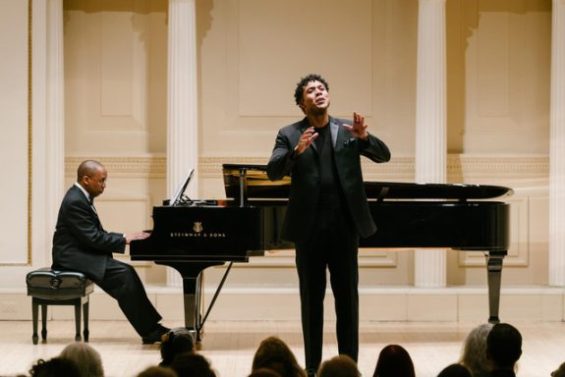 United States Various, ‘Don’t Be Angry’: Justin Austin (baritone), Howard Watkins (piano). Weill Recital Hall, Carnegie Hall, New York, 5.3.2024. (RP)
United States Various, ‘Don’t Be Angry’: Justin Austin (baritone), Howard Watkins (piano). Weill Recital Hall, Carnegie Hall, New York, 5.3.2024. (RP)

Weill/Brecht – ‘Mack the Knife’; ‘Ballad of the Easy Life’; ‘Call from the Grave’; ‘Death Message’ (The Threepenny Opera)
Ravel – ‘Chanson à boire’ (Don Quichotte à Dulcinée)
Wolf – ‘Herr, was trägt der Boden hier’ (Spanisches Liederbuch)
Weill – ‘Oh Captain! My Captain!’ (Four Walt Whitman Songs)
Bienert – ‘Augen in der Grossstadt’
Eisler – ‘Embrace the Fascists’
Ricky Ian Gordon – ‘Song for a Dark Girl’ (Only Heaven); Marvin Gaye Songs
Robert Owens – Mortal Storm, Op.29
Baritone Justin Austin and his frequent collaborator, pianist Howard Watkins, performed a recital of songs that resonated with irony, dissidence, regret and rage. Entitled ‘Don’t Be Angry’, it was part of Carnegie Hall’s ‘Fall of the Weimar Republic: Dancing on the Precipice’ festival.
In the program notes, Austin wrote that through these songs he aspires to be ‘a conduit for anger’, thereby enabling the audience to embrace the emotion and direct it accordingly. The songs he sang touched upon intolerance, indifference and incomprehensible random acts of violence. He isn’t espousing violence, but rather urging people to protect themselves from its omnipresence in our world.
Austin is gifted with an amber-hued baritone and immaculate musicianship. He is also a very physical singer who worked movement into almost every song. At times, he may simply strike a pose, at others he is stalking the stage or crouching like a tiger ready to pounce. There is often a gleam in Austin’s eyes and a smile on his face which are as disarming as the sentiments he was expressing through his voice.
At the core of the program were songs by Kurt Weill and Bertolt Brecht from The Three Penny Opera. Weill incorporated jazz, pop, German folk and the avant-garde into his instantly recognizable music. This sound and Brecht’s sardonic, biting lyrics encapsulate the aesthetics of the Weimar Era.
The Threepenny Opera rails against a society that spits out criminals, prostitutes and miserly capitalists, the latter of which devour the naive and witless. Austin assumes the persona of Mack the Knife, London’s greatest and most notorious criminal and the anti-hero of The Threepenny Opera, to guide the audience through the program. Starting with ‘Mack the Knife’, he lent panache to them all.
Austin also performed Ricky Ian Gordon’s Marvin Gaye Songs, which he and Watkins premiered last year at the University of Arizona. The songs, which were commissioned by the Tucson Desert Song Festival, are settings of poems by Vievee Francis, ‘Marvin Gaye: Mercy’ and ‘Marvin Gaye: Sugar’. The narratives deal with the death of the great pop singer at the hands of his father in 1984.
The two pieces revealed Austin the storyteller as he painted the complex emotions captured in Gordon’s lush, pop-infused settings of Francis’s probing, challenging words. The first of the two songs, ‘Mercy’, careened from dreamy happiness to grim despair. Austin infused ‘Sugar’ with charm as he told of a woman who liked a troubled man. A classic Austin moment came when he sang ‘Give me a feral cat to bathe in the sink. To blow-dry and pet’. The sound of his voice could have melted the iciest of hearts.
Composer Robert Owens was born in Texas in 1925 and died in Munich in 2017. During World War II, he learned German from POWs being held in Arkansas. After the war, he used the GI Bill to study at the Paris Conservatoire. Alfred Cortot numbered among his teachers.
Owens was introduced to Langston Hughes in 1958 and would go on to set scores of his poems. Upon hearing his words in a setting by Owens, Hughes said ‘My God, they just sound so much more beautiful with music’. The cycle Mortal Storm, composed in 1969, contains settings of Hughes poems that deal with the turbulence of human existence.
The first of the cycle’s five songs, ‘A House in Taos’, is aria-like in scope and emotion with its depiction of three people addressing the rain, sun, moon and wind. As fine as Austin was in portraying the multiple characters and moods in the song, it was Watkins’s playing that summoned the primeval forces of the natural phenomena Owens had captured so effectively.
Austin began ‘Little Song’, the second piece, sitting at the corner of the stage. Pianist and singer painted the dreams of lonely people who toil their entire lives with no reward in an eloquent performance tinged with softness and sadness.
‘Genius Child’, the final song of the cycle, is just the opposite in mood. Full of frenzy, defiance and anger, it rails against society’s impulse to destroy people who soar like eagles with their radical and dangerous thoughts. Expressing such sentiments is Austin’s forte, but Watkins got the final say with the three violent chords depicting the violent death of a genius child that end the song.
If you could call them such, Olaf Bienert’s ‘Augen in der Grossstadt’ and Hanns Eisler’s ‘Embrace the Fascists’ were among the highlights of the recital. The words are by Kurt Tucholsky, one of Weimar Germany’s sharpest political satirists. Austin was at his arched, stylistic best as he sang Bienert’s setting of Tucholsky’s instructions on how to spot a Fascist. Given the sentiments of the song, it was a surprise that it found the singer at his most reflective.
Austin infused Eisler’s setting of Tucholsky’s ‘Embrace the Fascists’ with bitter irony and sardonic humor. He made the Sign of the Cross as he sang about those who succumbed to the Fascists’ rhetoric and received their blessings. There was menace in his voice and eyes when he spit out a warning that when you feel the Nazi’s knife twisting in your guts, you must embrace the monster that you have made.
The recital ended with Austin returning to a verse of ‘Mack the Knife’, the song with which the recital began. His sole encore was ‘I’m a poor li’l orphan in this worl’’, arranged by Julia Perry. It was beautiful, simple and profound, which are among the qualities that sum up this brave young artist at his best.
Rick Perdian
Featured Image: Justin Austin (baritone) and Howard Watkins (piano) © Fadi Kheir

Rick! Thanks for this lovely review!